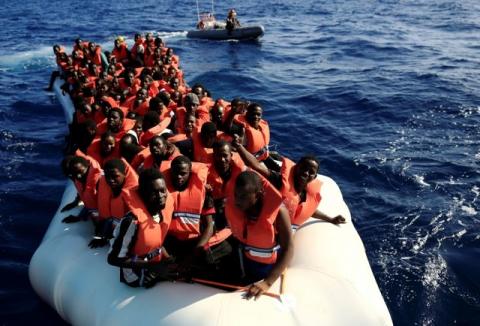Advertisement
Merkel on economic mission to Africa to curb migrant flow
BERLIN (Reuters) - German Chancellor Angela Merkel heads to Africa on Sunday seeking investment opportunities which her government hopes will drive economic development on the continent and curb future waves of migration to Europe.
A flood of almost a million migrants into Germany last year, many from Syria and Iraq, has hit Merkel's popularity at home. A European Union deal with Turkey helped stem the flow from the Middle East and Asia, but thousands of people still risk the perilous Mediterranean crossing every day from Africa to Europe.
"The migration pressure will increase dramatically in the coming years if we do not manage to generate economic prospects in African countries," German Development Minister Gerd Mueller told Reuters.
Merkel has described Africa, with its population of 1.2 billion people, as "the central problem" in the migration issue, and last month said the EU needed to establish migrant deals with north African countries along the lines of the Turkey deal.
She visits Mali on Sunday, Niger on Monday and Ethiopia on Tuesday in her first multi-day trip to Africa since 2011.
Germany, France and Italy want to develop particularly close partnerships with Niger and Mali, which they see as key states in the migration issue. In Mali, Germany has over 550 soldiers as part of a U.N. peacekeeping mission.
Merkel, who has yet to declare if she will seek a fourth term as chancellor next year, wants to discuss bilateral aid and business investment on her trip, rather than aiming to secure any deals to return migrants there.
"Being an open society means that we should try to aim for a kind of balance such that the first thing for young Africans, when they get a smartphone in their hands, isn't 'I have to go where I see a better world,' but rather that they live in a country in which things are at least getting better step by step," she told an industry conference on Thursday.
"This is our task," Merkel added.
Mueller pointed to the energy sector as an area where there was an opportunity for a "win-win partnership" for Africa and German businesses, which have been pioneering in developing solar technology.
"We have the innovation, Africa has the sun and needs innovation," he said.
However, the experience of the Desertec renewable energy project, founded in Germany to much fanfare in 2009, has made businesses skeptical about such schemes as investors worry about security risks associated with investing in Africa.
Desertec aimed to help to provide up to 15 percent of Europe's power from solar and wind parks in North Africa and the Middle East by 2050 but it all but folded after the withdrawal of most of its shareholders.
"We need a Marshall Plan for Africa," said Mueller, looking for international stakeholders to contribute as Germany prepares to make Africa a focus of its G20 presidency next year. Berlin is also open to working with China on infrastructure projects.
"We are looking into doing joint projects with the Chinese," a Merkel adviser said.
(Additional reporting by Noah Barkin and Michael Nienaber; Writing by Paul Carrel; Editing by Dominic Evans)



















Add new comment